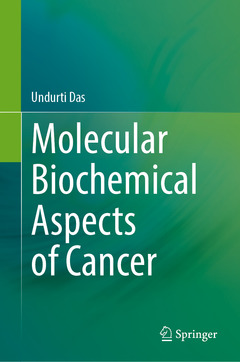Molecular Biochemical Aspects of Cancer, 1st ed. 2020
Auteur : Das Undurti N.

This book discusses the role of genes, oncogenes, anti-oncogenes, free radicals, PUFAs, anti-oxidants, lipid peroxidation process, telomere, and angiogenesis on the origin of cancer, cell proliferation, and cancer in general. It includes a broad introduction to cancer cells; genes, oncogenes, and anti-oncogenes; and free radicals. In later chapters, it discusses in depth the relationship among free radicals, lipid peroxidation and anti-oxidants in cell proliferation. It also discusses aerobic and anaerobic metabolism and their relationship to cancer, as well as the Warburg effect and its potential in the development of new targets for cancer management. Based on these and other evidences, Molecular Biochemical Aspects of Cancer introduces a novel concept that suggests that selective enhancement of free radical generation in tumor cells could form a strategy to induce apoptosis of cancer cells employing bioactive lipids. It presents a new method of treatment of cancer using in vitro, in vivo and clinical data. This book will interest oncologists, scientists, molecular biologists, life scientists.
Prof. Undurti N. Das is an M.D. in Internal Medicine from Osmania Medical College, Hyderabad, India; Doctor of Science (D.Sc.) from Mangalore University, India, a Fellow of the National Academy of Medical Sciences, India, a fellow of the Royal Society of Chemistry and Shanti Swaroop Bhatnagar prize awardee. Apart from clinical work, he is researching the role of polyunsaturated fatty acids, cytokines, nitric oxide, free radicals, and anti-oxidants in cancer, inflammation, metabolic syndrome, schizophrenia and tropical diseases. His current interests include cancer, molecular biological aspects of diabetes mellitus, hypertension, cardiovascular diseases, autoimmune diseases and metabolic syndrome. Dr. Das was formerly scientist at Efamol Research Institute, Kentville, Canada; Professor of Medicine at Nizam’s Institute of Medical Sciences, Hyderabad, India and Research Professor of Surgery and Nutrition at SUNY Upstate Medical University, Syracuse, USA. At present, he is the Chairman and Research Director of UND Life Sciences LLC, Battle Ground, WA, USA and Chairman and Professor of Medicine at GVP Hospital and Medical College, Visakhapatnam, India and Director of BioScience Research Centre, GVP College of Engineering campus, Visakhapatnam, India serves as a consultant to both Indian and USA based biotech and pharmaceutical companies. Undurti Das is the Editor-in-Chief of the international journal: Lipids in Health and Disease; Academic Editor of Medicine and Review Editor of Nutrition journals and serves on the editorial board of another 10 international journals. Dr. Das has authored more than 500 international publications, wrote 4 books and has been awarded 6 USA patents. He is now developing lipid-based drugs for cancer, diabetes mellitus, lupus and rheumatoid arthritis and sepsis.
Discusses the role of genes, oncogenes, anti-oncogenes, free radicals, PUFAs, anti-oxidants, lipid peroxidation process, telomere, and angiogenesis on the origin of cancer, cell proliferation, and cancer in general
Introduces a novel concept that suggests that selective enhancement of free radical generation in tumor cells could form a strategy to induce apoptosis of cancer cells
Presents a new method of treatment of cancer using in vitro, in vivo, and clinical data
The concepts presented in the book also could form the basis of developing newer therapeutic approaches to a broad range of clinical conditions such as autoimmune diseases including multiple sclerosis, lupus, rheumatoid arthritis, inflammatory bowel diseases; sepsis; Alzheimer’s disease; depression; cardiovascular diseases; and diabetes mellitus all of which are inflammatory conditions
Date de parution : 05-2020
Ouvrage de 254 p.
15.5x23.5 cm



